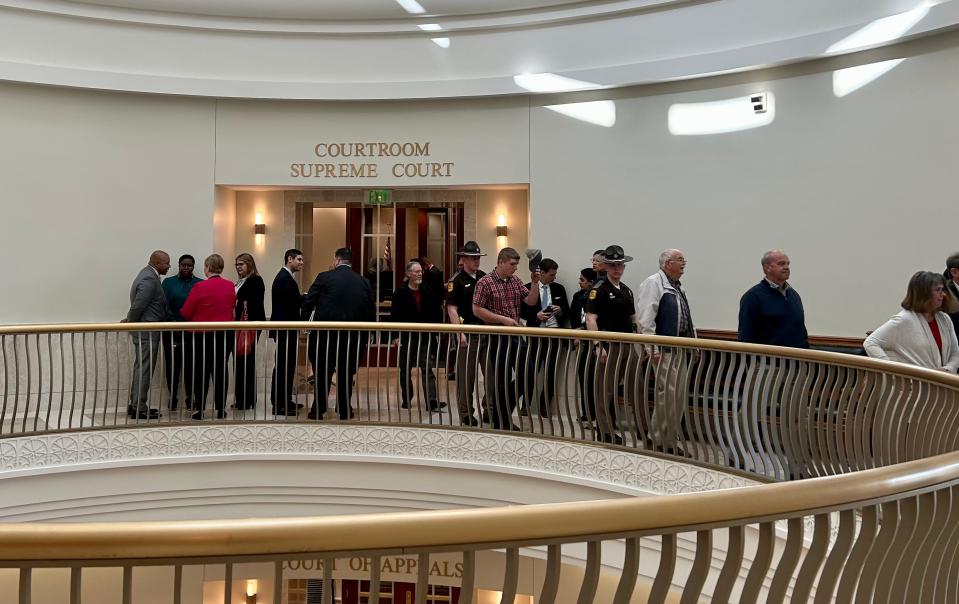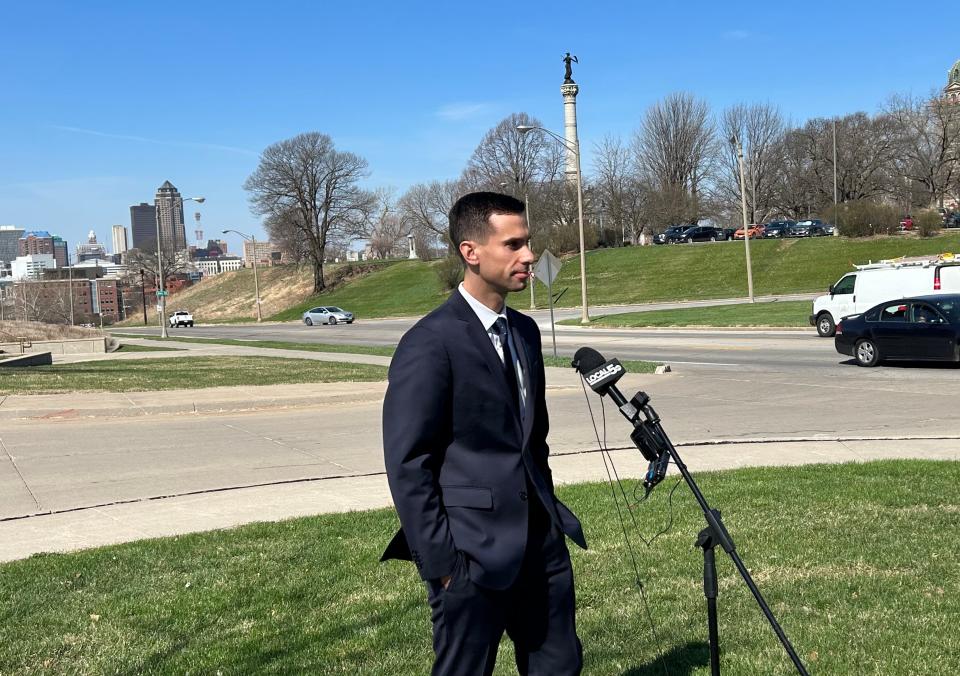Will the Iowa Supreme Court allow a 6-week abortion ban? Lawyers make their case.
- Oops!Something went wrong.Please try again later.
Attorneys for Planned Parenthood and the state made their cases Tuesday in oral arguments before the Iowa Supreme Court, which must decide whether a law banning abortions after six weeks of pregnancy should be allowed to take effect in Iowa.
Republican lawmakers passed the so-called "fetal heartbeat" law in 2018. It would ban nearly all abortions after about six weeks of pregnancy, when the first cardiac impulses can be detected in an embryo. Courts blocked that law from ever taking effect.
In the interim, abortion laws in Iowa and nationwide have been shaken by a string of recent court decisions.
The Iowa Supreme Court ruled last summer that the state constitution does not protect a fundamental right to an abortion, and the U.S. Supreme Court overturned the landmark Roe v. Wade case. In response, Gov. Kim Reynolds asked the state courts to lift their injunction so the 6-week abortion ban could take effect.
A district court judge ruled in December that the permanent injunction on the law would remain in place. Reynolds appealed that decision, sending the case to the Iowa Supreme Court.
Six of the seven Iowa Supreme Court justices heard arguments in a packed chamber on Tuesday morning. Justice Dana Oxley was not present.
Lawyers representing the state argued Tuesday that the law should be allowed to take effect since the courts have now ruled that neither the Iowa Constitution nor the U.S. Constitution guarantees the right to abortion.
Justices quizzed the attorneys on the legal precedent to reconsider a blocked law once deemed unconstitutional, and they asked why Iowa doesn't simply pass a new law clarifying the state's stance on abortion.
Gov. Kim Reynolds sat in the front row of the courtroom, directly behind her lawyers.
Attorneys for Planned Parenthood of the Heartland and the Emma Goldman Clinic urged the Supreme Court to dismiss the governor's appeal and to agree with the district court that the injunction should remain in place.

What are Iowa's abortion laws right now?
Under current law, abortions are legal in Iowa until 20 weeks of pregnancy.
The legal landscape for abortion has changed significantly over the last several years. In 2022, the U.S. Supreme Court overturned Roe v. Wade, giving states the power to enact more restrictive abortion laws.
Also last year, the Iowa Supreme Court reversed its 2018 decision and ruled that the state constitution does not protect a fundamental right to an abortion.
Republican lawmakers have not passed any new restrictions on abortion this year. Reynolds and leaders of the Iowa House and Senate have said they're waiting for a court decision before introducing new legislation.
Reynolds' lawyers: Lift the injunction and let the law take effect
Lawyers for Reynolds argued that the courts have the power to undo the 2018 injunction and allow the law to go into effect.
Chris Schandevel, an Alliance Defending Freedom attorney who argued the case on the state's behalf, said the 2018 law should be reconsidered under the current interpretation of the state constitution, where abortion is no longer considered a fundamental right subject to the strictest legal scrutiny.
"We know now, today, that even though this court and the U.S. Supreme Court had previously misinterpreted the federal constitution and the Iowa Constitution, that what the Legislature did in 2018 in enacting the fetal heartbeat law is perfectly consistent under both constitutions, because there is no fundamental right to abortion," said Schandevel.

Justice Edward Mansfield, who wrote last year's majority opinion that revoked a fundamental right to an abortion, asked Schandevel why the Legislature couldn't pass a new law, which would be litigated under new legal standards.
"When the prior law was adopted, it was clear that it would be unconstitutional as soon as it was adopted," Mansfield said. "Why not give the Legislature an opportunity to go back and pass whatever law they now think is appropriate in this area?"
Schandevel responded that the Legislature can decide if it wants to amend the 2018 law after the injunction is lifted.
In a statement, Reynolds said she is "optimistic" that the courts will allow the law to take effect.
"Since the U.S. Supreme Court overturned Roe v. Wade, decision-making power has been returned to the states," she said. "Our citizens and their elected officials have chosen to promote life and end abortion at a heartbeat, with exceptions for rape, incest and life of the mother.”
More: Iowa stops paying for rape victims' morning-after pills and abortions
Planned Parenthood: Keep the injunction in place
Lawyers for Planned Parenthood and the Emma Goldman Clinic urged the court not to overturn the four-year-old injunction, citing procedural concerns with relitigating a law that was deemed unconstitutional when it first passed.
Peter Im, an attorney for Planned Parenthood Federation of America, said the state is "trying to revive this law without going through the proper procedures."
"Because of the strange procedural posture of the case, because this case was decided under a different (legal) standard and then the next time the issues were live was a motion to dissolve (the injunction), there are claims in this case that haven't even been litigated at all," Im told the court.
Im argued that the law was unconstitutional when it was passed in 2018, and therefore is legally void. Justice Christopher McDonald peppered Im with questions about what it means for a law to be void and whether that prevents the court from reconsidering it later.
Democrats on Tuesday criticized Reynolds for her efforts to revive the law and restrict abortion.
"While we await the Iowa Supreme Court ruling, Iowans should know that abortion in Iowa is still legal today, and Iowa House Democrats will never stop fighting to protect reproductive freedom," House Minority Leader Jennifer Konfrst, D-Windsor Heights, said in a statement.
What is the legal standard for abortion in Iowa?
It's not clear what legal standard Iowa courts will apply when considering whether restrictions on abortion are constitutional.
In 2018, the Iowa Supreme Court ruled that abortion was a fundamental right, and any laws restricting it would be held to the highest legal standard, known as "strict scrutiny."
Last summer's reversal of that decision signaled that the court would be open to further litigation over what standard should apply.
"Although we overrule (the 2018 decision), and thus reject the proposition that there is a fundamental right to an abortion in Iowa’s constitution subjecting abortion regulation to strict scrutiny, we do not at this time decide what constitutional standard should replace it," Mansfield wrote in the majority opinion.

The state and Planned Parenthood disagreed about what the legal standard is for abortion laws in Iowa.
In a call with reporters after the hearing, Im said that abortion laws in Iowa are still subject to the "undue burden" standard, an intermediate level of scrutiny focusing on whether a law excessively limits a woman's ability to obtain an abortion.
"And under the undue burden standard, the six-week ban is absolutely unconstitutional," Im said.
That aligns with the December decision from District Court Judge Celene Gogerty, who deferred to the Iowa Supreme Court's 2015 decision dictating that courts should use the undue burden standard. Gogerty ruled the six-week ban would be an undue burden on women and thus remains unconstitutional.
Schandevel said laws restricting abortion should instead be considered under the most permissive legal threshold, known as "rational basis." That's the new federal standard after the U.S. Supreme Court's Dobbs decision last summer.
The court's decision in Tuesday's case may offer clarity on the legal standard for abortion laws in Iowa going forward.
More: 20 GOP lawmakers file bill to ban all Iowa abortions. Why their leaders say it won't pass.
How does Iowa abortion law intersect with federal decisions?
Abortion access has been thrust into the national spotlight this week, after a federal judge in Texas on Friday put a halt on government approval of the abortion drug mifepristone, vastly curtailing access to medication abortion nationwide.
The ruling may bar health care providers nationwide from prescribing mifepristone, even in states where abortion is legal.
Another federal judge in Washington ordered the Food and Drug Administration not to restrict access to the drug in the 17 states and D.C. that sued to expand access to mifepristone. Iowa is not one of those 17 states.
The Justice Department appealed the ruling, but it's unclear how the FDA will balance the competing orders. It's likely that the U.S. Supreme Court will need to decide the argument.
Mazie Stilwell, director of public affairs for Planned Parenthood North Central States, said there are "many questions that remain unanswered." Stilwell said Planned Parenthood was prepared to provide an alternative abortion medication known as misoprostol.
"When it comes to continuing to provide medication abortion, PP health centers in whatever states end up being affected are certainly prepared to move to a misoprostol-only regimen," Stilwell told reporters.
The Alliance Defending Freedom filed the lawsuit against mifepristone use in Texas.
The Arizona-based conservative group has been a participant in Iowa politics over the past year.
Schandevel argued the abortion law on behalf of the state before a district court last fall and again on Tuesday, despite the election of a Republican attorney general.
The Alliance Defending Freedom has also been a proponent of laws to ban gender-affirming treatment for transgender minors. Sen. Jeff Edler, R-State Center, told reporters that the group helped draft Iowa's bill banning gender-affirming care for people under 18.
William Morris, Stephen Gruber-Miller and USA Today contributed reporting.
Katie Akin is a politics reporter for the Register. Reach her at kakin@registermedia.com or at 410-340-3440. Follow her on Twitter at @katie_akin.
This article originally appeared on Des Moines Register: Iowa Supreme Court hears arguments on 'fetal heartbeat' abortion law

